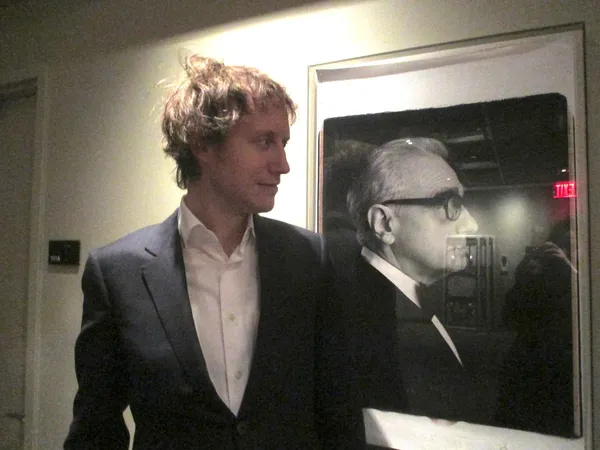 |
| László Nemes (looking at Martin Scorsese) on the stiff collar worn by Írisz in Sunset, costumes by Györgyi Szakács: "And it goes down with the film." Photo: Anne-Katrin Titze |
Sunset (Napszállta) is cinema at its astute and enchanting finest. Max Ophüls and Jean Renoir may come to mind and the scene in the shoe department of Romanze in Moll, Helmut Käutner's take on Guy De Maupassant. In a similar mode to the way László Nemes chained us to the back of the neck of Géza Röhrig's Saul Ausländer in his groundbreaking, Oscar-winning Son Of Saul (also shot by Mátyás Erdély), he attaches us firmly to his Sunset heroine Írisz Leiter (Juli Jakab), a young woman who returns, after years of apprenticeship in Trieste, to her native Budapest in hopes of working as a milliner at the famous Leiter department store her deceased parents used to own.
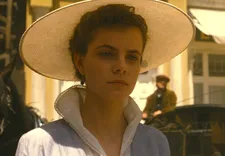 |
| László Nemes on Juli Jakab as Írisz in Sunset: "It's almost like the princess of the night, you know." |
Oszkár Brill, played by Vlad Ivanov (Cristian Mungiu's Graduation and 4 Months, 3 Weeks And 2 Days; Maren Ade's Toni Erdmann; Bong Joon-ho's Snowpiercer) is the new owner of the hat emporium and is busy preparing the festivities to celebrate the royal guests arriving from Vienna. He has no intention of hiring Írisz. The year is 1913 and the Austro-Hungarian monarchy is at its powerful peak.
László and I met at the Film Society of Lincoln Center and it was a funny coincidence that I was going to moderate the post-screening discussion with Géza Röhrig on To Dust later that same night.
Anne-Katrin Titze: You were the one who introduced me to Géza at a brunch for the Steve Jobs film [directed by Danny Boyle]. I don't know if you remember.
László Nemes: Really? That's unreal.
AKT: Steve Jobs!
LN: Who just was dead at that time.
AKT: I was just talking to someone who knows me very well that there is so little nourishment to get from films these days. Often I watch something, a movie, and there is actually nothing there. There is no substance. And I got a lot of substance from Sunset.
LN: Good. Thanks. It was made out of substance, for sure.
AKT: The metaphysical component for you is important.
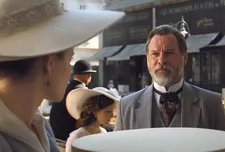 |
| Írisz Leiter (Juli Jakab) with Oszkár Brill (Vlad Ivanov) |
LN: It's very instinctive but I think the guiding substance, as you call it, would be interrogating the mystery of the downfall of a civilisation, the civilisation of the turn of the century, that was completely unexpected.
And that came, it seems, as a direct consequence of the incredible illusion and promise of the turn-of-the-century society. In a way it seemed the zenith of civilisation might be inseparable from its own demise, the demise of civilisation.
AKT: The dance on the volcano came to mind for me. It is a celebratory idea of where we are. I am saying where we "are", because Sunset also felt - after it was over as well as while watching - as some kind of futur antérieur of what will have been. As if you are talking about the past and the future simultaneously.
LN: Interesting!
AKT: The film has the dimensions of a past that is going to happen.
LN: I like TS Eliot.
AKT: I do too.
LN: It's also in TS Eliot, this kind of ...
AKT: "HURRY UP PLEASE IT'S TIME".
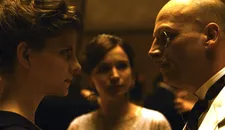 |
| Írisz Leiter (Juli Jakab) with the Man with Monocle (Enrique Keil) |
LN: Also that. And "In my beginning is my end". And that there are so many ideas in him, in his poetry, that resonate, I think, very profoundly in the world and in this film.
AKT: You have The Waste Land mentioned in the end credits.
LN: Yeah, because there's a scene in the tent, when she is looking for, you know, with the faceless woman and then she has this vision of her brother and we hear the voice.
AKT: That is in The Burial Of The Dead? The clairvoyant?
LN: Yes.
AKT: There's more to it, but The Waste Land is in a way the partner in crime to Sunset?
LN: In a way yes, I think they have this mixture of things. That's why I also like Eliot. It's because you have layers. You're not in post-modernism, you're in something modern. You have your roots in something that goes back in time, in other zones of civilization. I really can feel that. We just feel today that we are in a new world and nothing can happen to us. But we don't see the caves of darkness underneath.
AKT: I like the way history enters The Waste Land. For instance, the line "Summer surprised us, coming over the Starnbergersee." That is the lake where King Ludwig drowned. If you don't know he died there, you don't need to know to feel it.
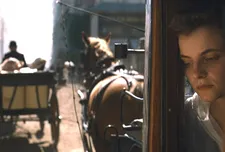 |
| László Nemes on Írisz (Juli Jakab): "It's also the eye and it's also the camera." |
LN: No, as Eliot said, it's not about understanding. It's about feeling it.
AKT: And everybody knows what it means - rain surprising you, summer surprising you.
LN: But it's very Central European in a way. And about the archduke.
AKT: Absolutely. The entombed Empress Sisi chamber in the hat store in your film - what a fantastic idea! How did you come up with this?
LN: I don't know, layers, I guess. You have to do the archeology of the film. But this was a region so full of things happening - events and inventiveness and creation and promise and so much history also. In a way it was magical times. And Sisi was a promise also.
AKT: For women?
LN: But also different because maybe Austria-Hungary wouldn't have disappeared like that. Although I have to say, that nations wanted so much their own independence, I don't know how differently it could have ended.
AKT: You like to show us the back of the neck of Írisz [Juli Jakab] and the collar that she wears. It's so stiff, as if there were a bit of metal in it.
LN: That's interesting, yes.
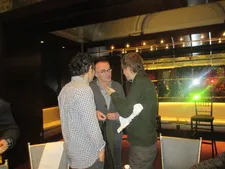 |
| Géza Röhrig and László Nemes with Danny Boyle Photo: Anne-Katrin Titze |
AKT: It's holding it up.
LN: And it goes down with the film.
AKT: After a while, she loses it. That specific strength, that metal that is holding her up disappears. You have similar shots in Son Of Saul, where we see the back of the head and follow on the journey with him. Do you want to say anything about the collar?
LN: It's almost like the princess of the night, you know.
AKT: Saul you gave the last name Ausländer. In Sunset you give your protagonist the name Leiter.
LN: Well, for German-speakers, for sure.
AKT: The word has two meanings, it's a ladder and it's another word for Führer.
LN: I know, it's so interesting, no? The way you go up but also the one that can turn you into a slave. It's so interesting.
AKT: And her first name is that of a flower.
LN: It's also the eye and it's also the camera.
AKT: Of course. It's not Hyacinth, but Írisz.
LN: I was thinking of the hyacinth, of course. It's innocent but also a little bit ominous.
AKT: Innocent and ominous?
LN: It's like her.
Sunset opens in the US on March 22.





















